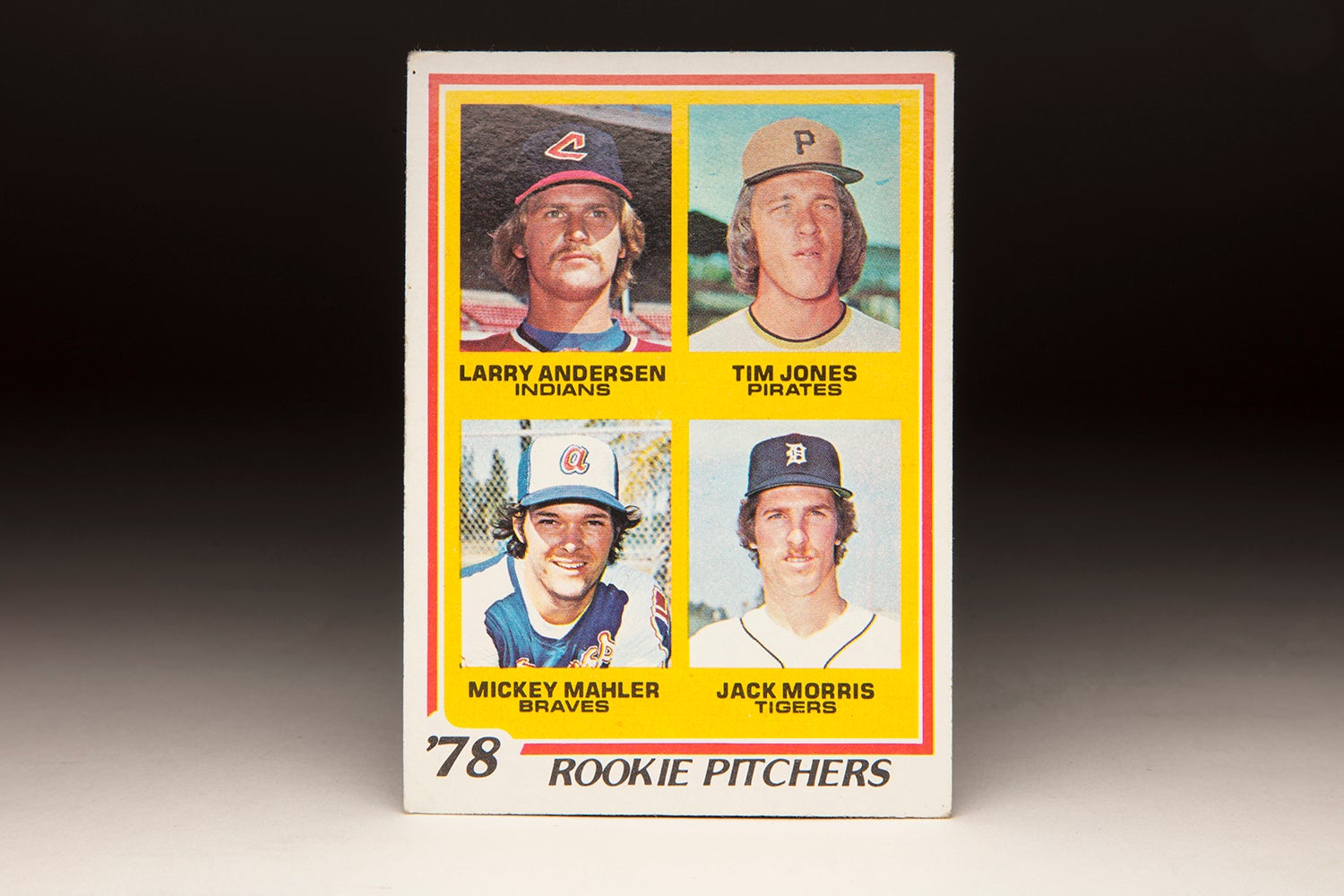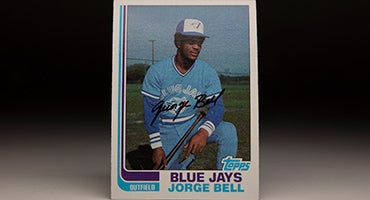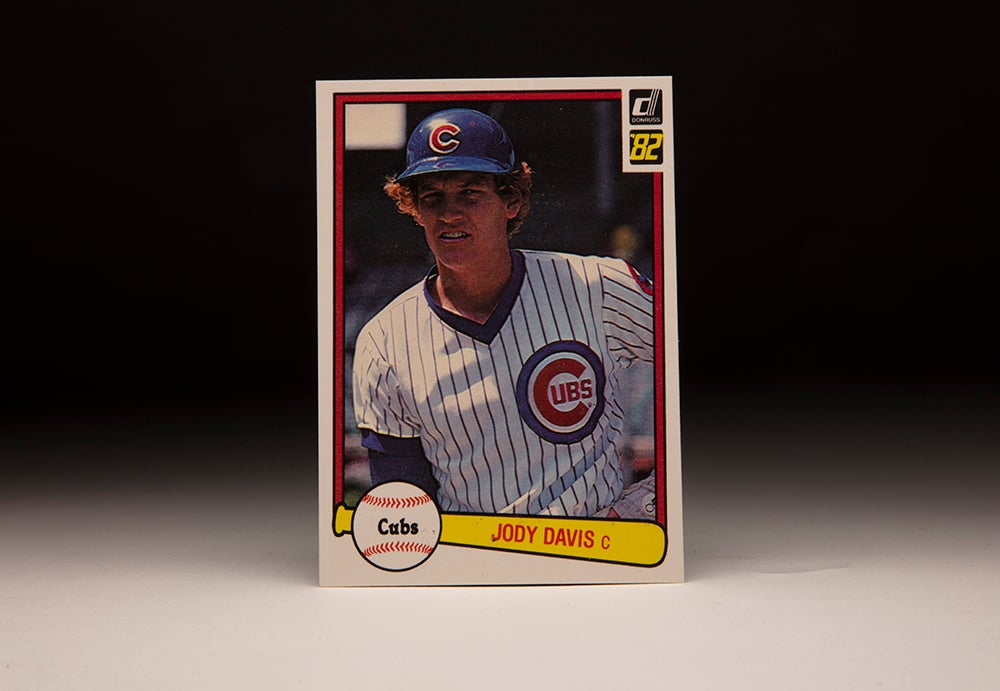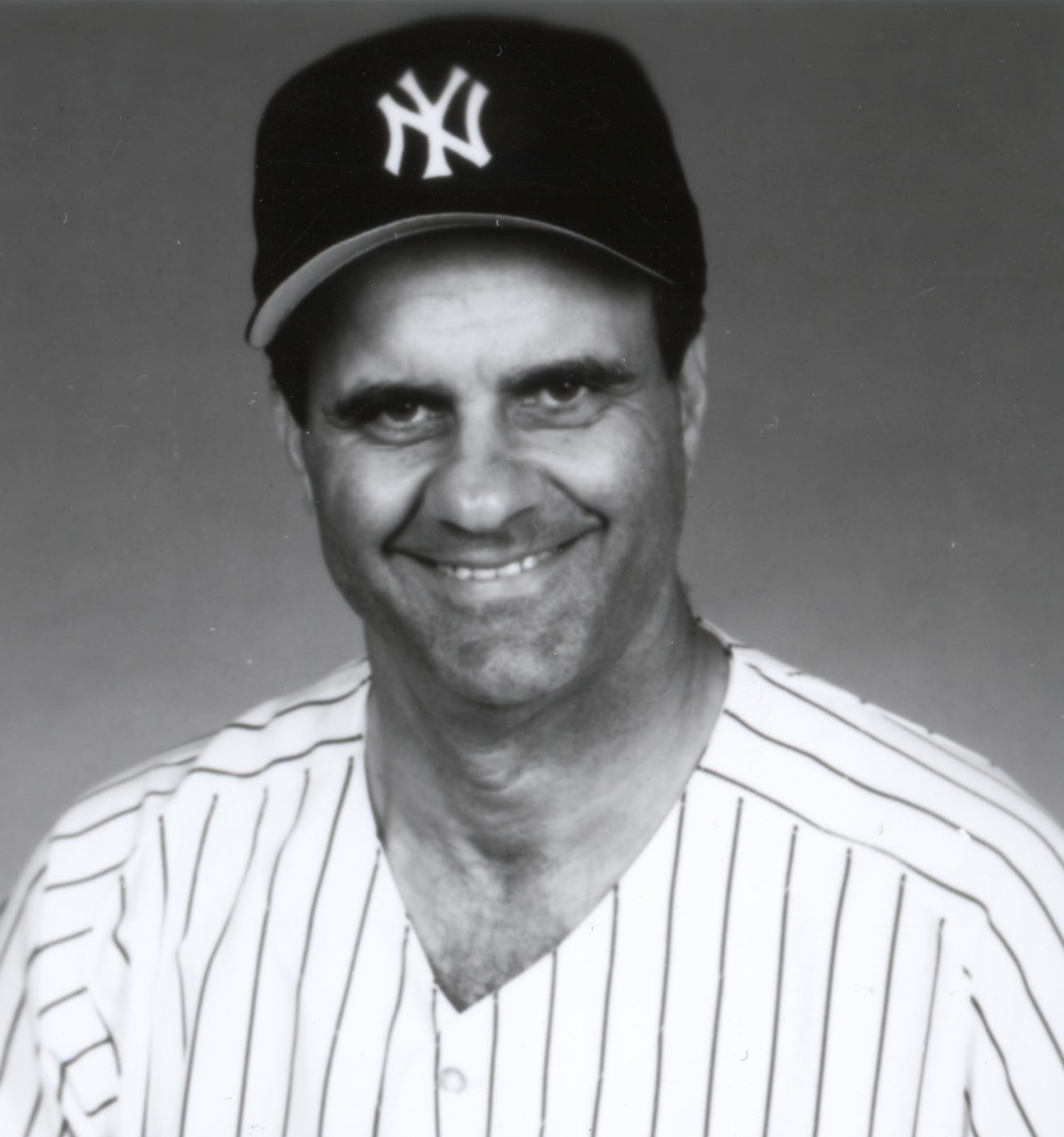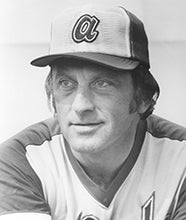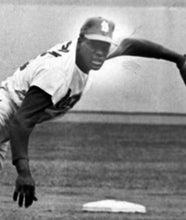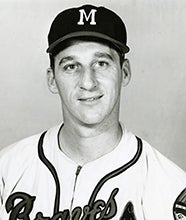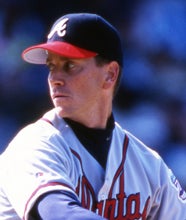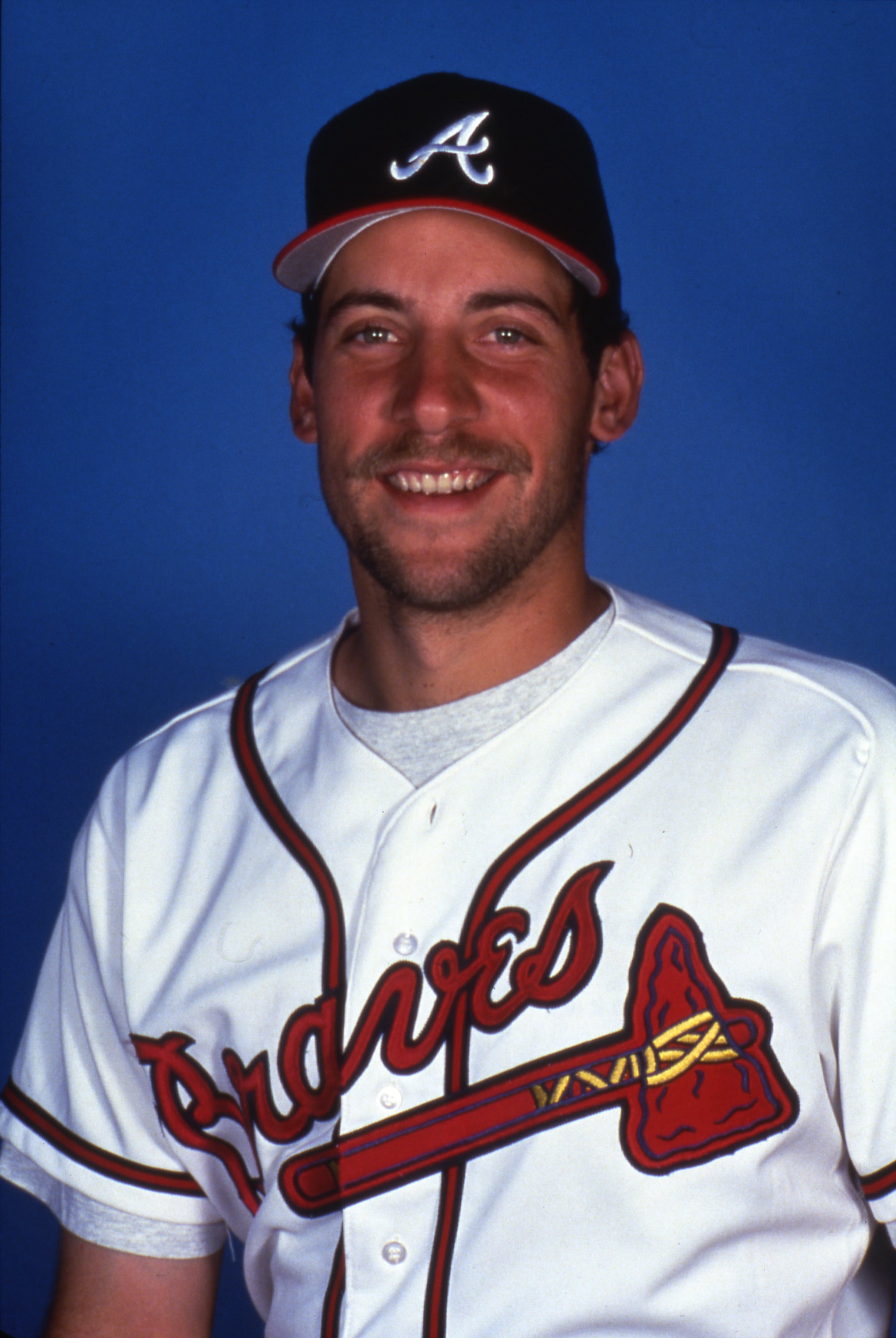- Home
- Our Stories
- #CardCorner: 1982 Donruss Rick Mahler
#CardCorner: 1982 Donruss Rick Mahler
Rick Mahler was a workhorse pitcher of the 1980s, topping the 200-inning mark six times while also posting seven seasons with double-digit loss totals.
But on Opening Day, Mahler was practically unbeatable – authoring three shutouts and working seven scoreless innings in another first-game outing.
And while pitching for the Braves just before they began their 1990s dynasty, Mahler helped mentor future Hall of Famers and All-Stars who would bring glory to Atlanta.
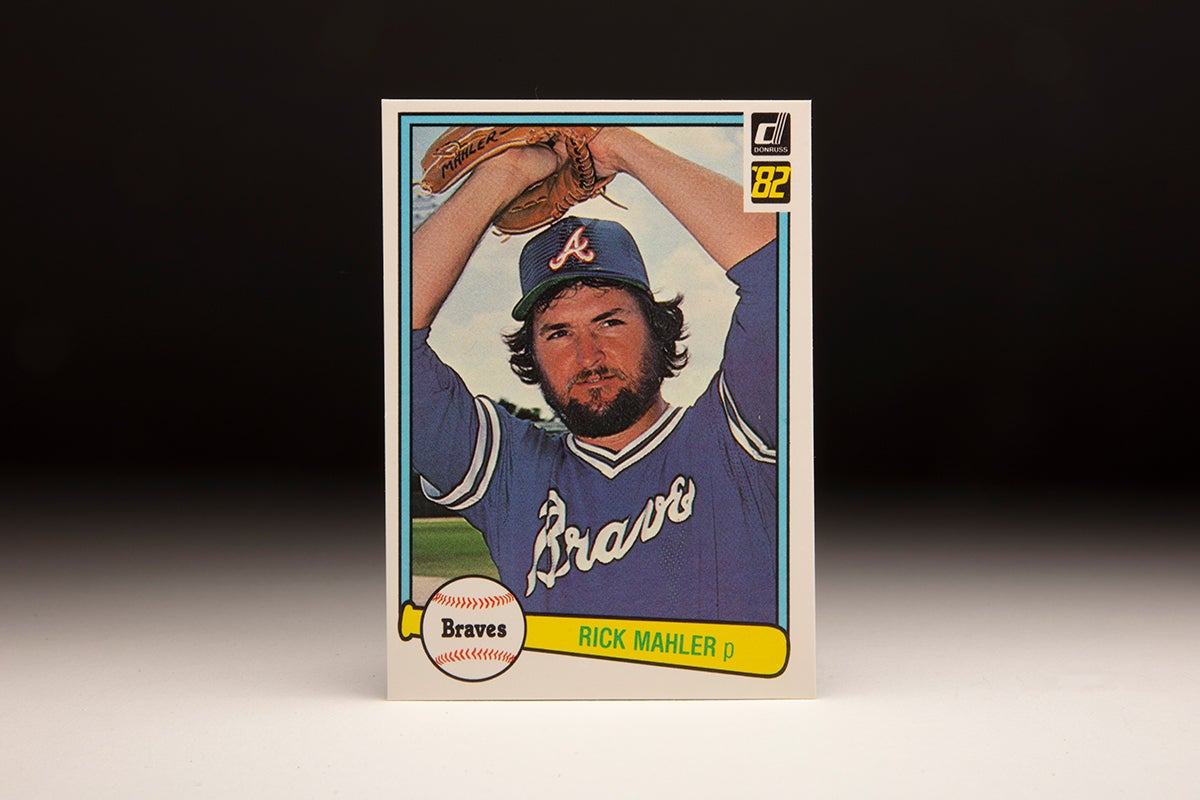
Born Aug. 5, 1953, in Austin, Texas, Mahler grew up in California, England and San Antonio as his father, an Air Force small arms trainer, was stationed around the world. He played baseball with his brother, Mickey, who was a little more than 12 months older. After their father was transferred from High Wycombe Air Base in England to San Antonio and subsequently retired, the brothers enrolled at Trinity University in San Antonio after graduating from John Jay High School, and Mickey – a left-handed pitcher – quickly jumped onto the radar of big league teams despite undergoing arm surgery while in college.
The Braves selected Mickey Mahler in the 10th round of the 1974 MLB Draft and sent him to Double-A Savannah, where he blitzed through the Southern League. The next year, Rick went undrafted while still at Trinity.
“I was in summer school at Trinity when Al LaMacchia (the scout who signed Mickey Mahler) called,” Rick Mahler told the Atlanta Constitution in 1982. “He said the Braves had a pitching shortage and wanted to know if I was interested in signing a contract. The next day, I flew to Kingsport, Tenn., and joined a team that already had 10 pitchers. I didn’t know how much work I would get. They put me in the bullpen, where I became the short man, and at the end of the year I was voted the most valuable pitcher on the team.”
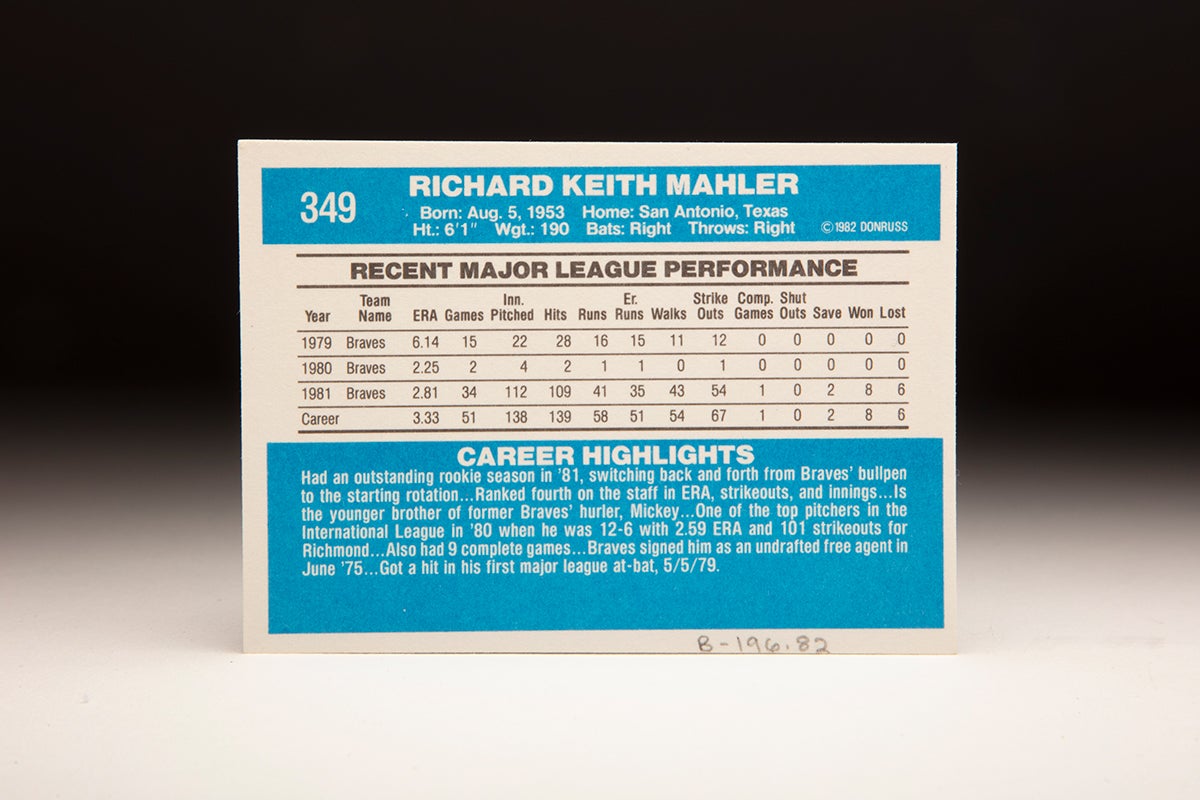
After signing a contract that provided no bonus and only promised him work during the 1975 season, Mahler was 2-2 with five saves and a 2.95 ERA in 26 games for Kingsport. That earned him a promotion to Class A Greenwood of the Western Carolinas League the following year. He was 6-6 with a 2.91 ERA, again mostly working out of the bullpen.
Then in 1977, Mahler started the year at Double-A Savannah, posting a 6-2 mark and 2.30 ERA in 17 games before being promoted to Triple-A Richmond. He struggled in his first stop at the top level of the minor leagues but returned to Richmond in 1978, where he went 9-5 with a 3.93 ERA as a spot starter and reliever.
Mahler was not a hard thrower, relying on curveballs, sliders and location to record outs. As a result, he was not considered a top prospect. But after a strong spring as a non-roster player in 1979, Mahler was a member of Atlanta’s Opening Day bullpen.
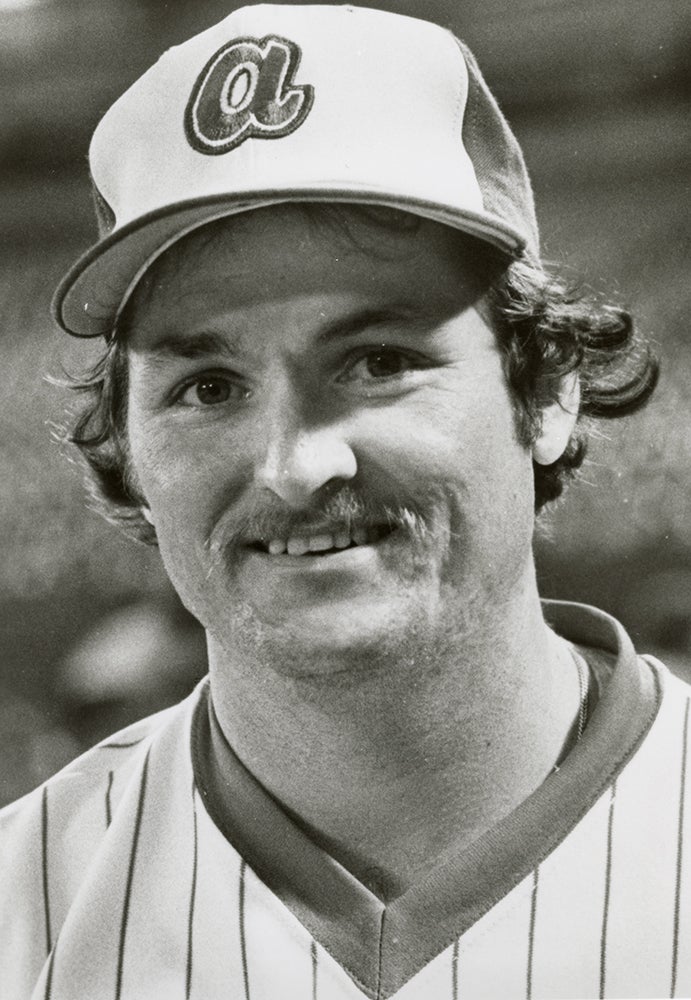
The move reunited the Mahler brothers, as Mickey had debuted with the Braves in 1977, made 21 starts in 1978 and was a member of the team’s starting rotation at the beginning of the 1979 season. Rick did not pitch until the team’s 13th game of the season and then served mainly in mop-up roles. The Braves were 0-13 in games he pitched – he didn’t record a decision or a save – when Atlanta sent him back to Richmond on June 10.
He returned to Atlanta in September after going 4-6 in 24 games in Triple-A, pitching in two more Braves losses to finish the season with a 6.14 ERA over 22 innings.
Mahler did not make the Braves’ Opening Day roster in 1980 but was more fortunate than his brother. Rick got sent back to Richmond while the Braves released Mickey – who started Atlanta’s home opener in 1979 – on March 29.
“I don’t see how I can pitch for this team for two whole years, and then suddenly they tell me: ‘Mick, we don’t want you anymore. You’re not good enough for us. You’re not even good enough for us to send you to the minor leagues,’” Mickey Mahler told the Atlanta Journal. “I cannot believe their pitching staff is so great they can just release me, but apparently they think it is.”
Rick Mahler also had his Braves destiny changed in 1980. He became a starter that year for Richmond, going 12-6 with a 2.59 ERA over 188 innings and tossed a one-hitter against Columbus in the International League playoffs. The Braves then brought him to Atlanta on Sept. 9 as the first change to the Braves’ 10-man pitching staff all season. He made two appearances out of the bullpen, allowing one run over 3.2 innings.
In 1981, Mahler once again made the Opening Day roster as a reliever and allowed runs in only two of his first 19 appearances. The Braves then moved him to the starting rotation, where he remained the rest of the season. He threw his first career complete game against the Astros on Sept. 23 and finished the year with an 8-6 record and 2.80 ERA. In his six losses – all of which came as a starter – the Braves scored a total of three runs.
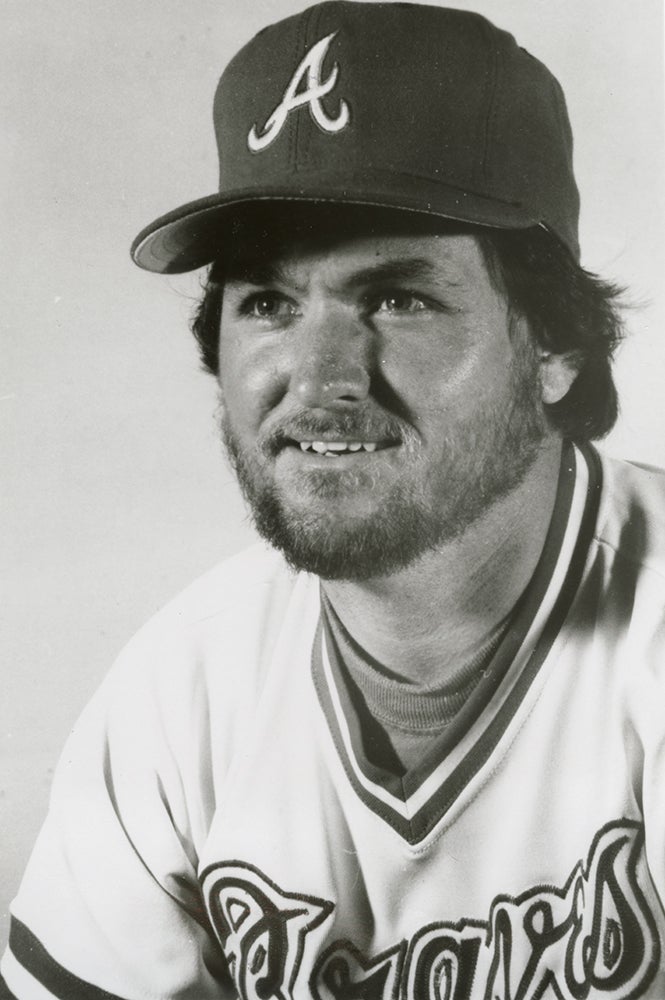
In 1982, Mahler was named the Braves’ Opening Day starter by new manager Joe Torre. A new change-up made Mahler more effective against left-handed batters.
“It’s the pitch I control best, next to my fastball,” Mahler told the Atlanta Constitution. “Throwing it when I am behind (in the count) has made a big difference.”
Mahler made sure he wouldn’t need much run support on Opening Day 1982 when he shut out the Padres on two hits. The Braves drew eight walks off San Diego starter Juan Eichelberger over 6.1 innings but tallied only one run on a Glenn Hubbard fifth-inning double that scored Brett Butler. Mahler allowed only one hit through eight innings before a two-out double by Ruppert Jones in the ninth. But Mahler struck out Sixto Lezcano to end the game and preserve the shutout.
In Mahler’s next start, he again pitched a shutout – this time blanking the Astros on five hits on April 11.
“Nobody expects to throw two straight shutouts but that’s what you intend to do when you go out there,” Mahler told the Associated Press.
The second shutout marked the Braves’ fifth win in as many games, and Mahler’s next two starts also resulted in wins (though he didn’t get a decision in either game) as the Braves sprinted to a 13-0 start to set a new record. Mahler could not maintain his blinding success – nor could the Braves – but he finished the season with a 9-10 record and 4.21 ERA in 205.1 innings as Atlanta won the National League West title. But in the NLCS vs. the Cardinals, Torre went with Pascual Pérez, Rick Camp and Phil Niekro as his starters as the Braves were swept in three games. Mahler pitched in relief in Game 3, allowing three hits and two walks (one intentional) but no runs in 1.2 innings as St. Louis won 6-2 to advance to the World Series.
Torre kept Mahler in the bullpen to start the 1983 season as the 10th man on the Braves staff. He edged out Bob Walk for the final spot.
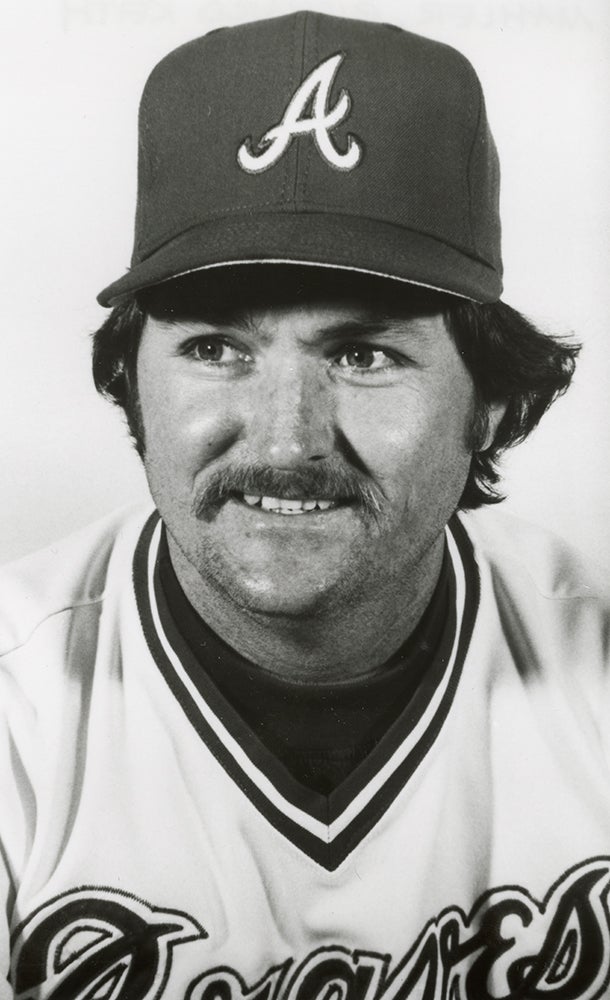
“I get the ball up,” Mahler told the Constitution of his troubles. “That’s one of Joe’s biggest gripes, and I agree with him. I know I have to prove myself. I don’t know exactly what my job is now, but I think of myself as a starter.
“I don’t have anybody to blame but myself. I had a bad Spring Training.”
But after 14.1 innings over 10 appearances in April and May, Mahler was sent back to Triple-A. He did not pitch in the big leagues again that season, going 12-7 with a 4.92 ERA in Richmond.
“When he’s not aggressive, he starts nibbling – trying to make too fine of pitches,” Torre told the Constitution. “Then he gets behind (in the count), and you can’t fool anybody when you’re behind.”
But Mahler got another chance in 1984 when the Braves released Niekro following the 1983 campaign. Mahler pitched well in winter ball in Puerto Rico and rescinded a demand for a trade he had made in 1983.
Then in the spring of 1984, Mahler met with Torre and pitching coach Bob Gibson, who both encouraged him to be more aggressive with his pitches.
“They said they were going to give me a chance to pitch the best way I know how,” Mahler told the Greensboro (N.C.) News and Record. “The only thing they pushed for was for me to be more aggressive on the mound and I understand that and I have tried.”
Mahler began the 1984 season in the Braves bullpen before moving into the rotation in May. After losing his first start, Mahler won five straight decisions and remained a starter the rest of the year, finishing 13-10 with a 3.12 ERA in 222 innings.
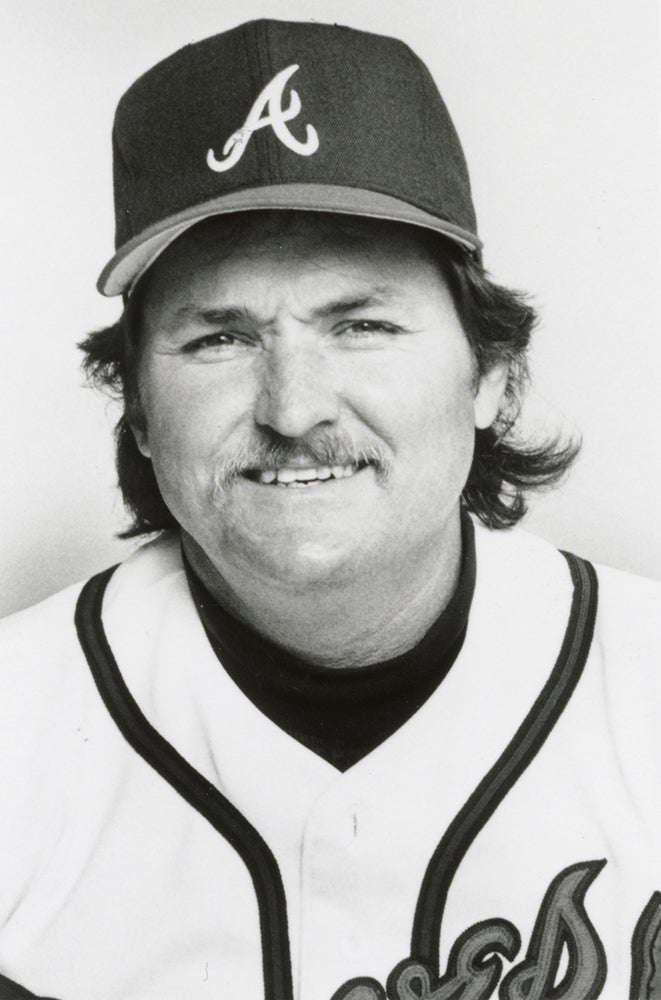
Torre was replaced by Eddie Haas in 1985, and Johnny Sain – a longtime Mahler supporter in the Braves’ minor league system – took over for Gibson as pitching coach. Mahler earned the second Opening Day start of his career and pitched seven shutout innings against the Phillies, earning a victory in a 6-0 Atlanta win.
“Rick Mahler is a pitcher and that’s the best compliment you can give somebody,” Sain told the Atlanta Journal. “Throwers go hard for one, two, three innings. But guys like Rick are nine-inning pitchers.”
Mahler followed up with six wins in his next six starts – becoming the first Braves starter to begin the year 7-0 since Warren Spahn in 1947 – and was 13-7 with a 3.27 ERA at the All-Star break. But it was not enough to earn him an invitation to the All-Star Game in Minneapolis. NL manager Dick Williams selected pitchers Dwight Gooden, Nolan Ryan, Joaquín Andújar, LaMarr Hoyt (who started the All-Star Game), Goose Gossage, Fernando Valenzuela, Scott Garrelts, Ron Darling and Jeff Reardon for the National League squad.
“I felt I had a legitimate chance but I suppose a lot of guys did,” Mahler told the AP. “I’m disappointed, but I realize it was a tough decision to make.”
Mahler had a 15-8 record at the end of July but lost seven of his last nine decisions to finish 17-15. He led the majors with 39 games started and also surrendered the most hits in the NL with 272.
Mahler got the Opening Day nod again in 1986 – becoming the first Braves pitcher since Niekro in 1979-80 to start consecutive openers – and pitched another shutout, blanking the Expos on five hits. He endured a six-game losing streak during the season and at one point dropped nine of 10 decisions but never failed to take the ball, pacing the league in starts again with 39 while finishing with an MLB-worst 18 losses against 14 wins with a 4.88 ERA.
In 1987, Mahler again started on Opening Day and tied a record with his third shutout, this time limiting the Phillies to three hits in a 6-0 win. The cap he wore that day is part of the collection at the National Baseball Hall of Fame and Museum, documenting his Opening Day dominance.
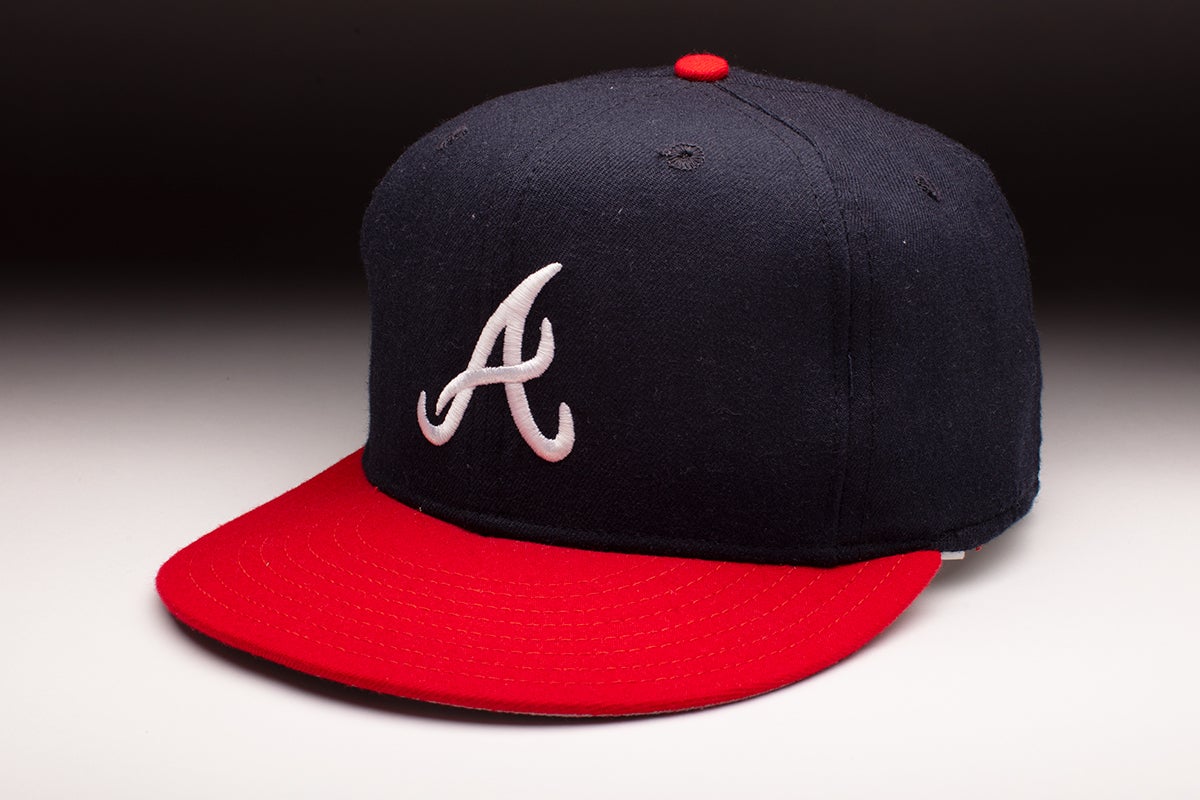
But after improving his record to 2-0, Mahler lost seven straight decisions. By August, he was 6-12 with a 5.11 ERA before the Braves moved him to the bullpen for the rest of the year.
“He’s throwing a couple good pitches but making a mistake with the other,” Braves pitching coach Bruce Dal Canton told the Constitution. “And that’s what’s been hurting him.”
Mahler finished the year with an 8-13 record and 4.98 ERA. He began the 1988 season – the final year of his contract with the Braves – with his fifth Opening Day assignment, allowing four runs over five innings in a no-decision against the Cubs. He lost his next four starts but then reeled off seven straight wins to improve to 7-4.
The Braves, meanwhile, were in the midst of a 106-loss season. Mahler’s name was bandied about in trade talks throughout July and August, but the Braves could not find a satisfactory offer and held on to Mahler for the rest of the season.
“Yeah, same old story: Everybody wants Rick Mahler, but nobody wants to give anything for him,” Braves manager Russ Nixon told the Constitution. “We’re going in a direction with our young pitchers but Rick Mahler is a damn valuable member of our staff. He’s the only stabilizer we have, he pitches with two days rest, three days rest, and he’s never been hurt. And he’s a class individual, and all those things are attributes young pitchers can learn from.”
Mahler finished the year 9-16 with a 3.69 ERA over 249 innings. It would be another three years until the Braves made the postseason, but on Atlanta’s roster in 1988 were future rotation stalwarts Tom Glavine and John Smoltz. Mahler’s veteran leadership would influence both their careers.
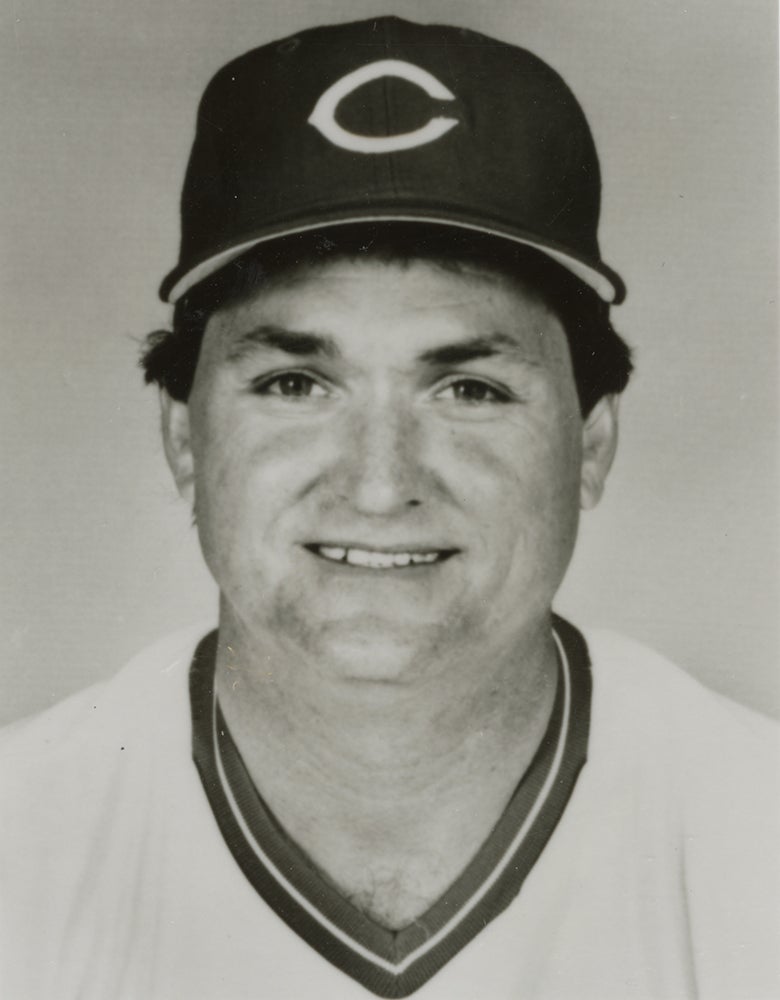
After negotiating with both the Braves and the Reds, Mahler signed a two-year free agent deal with Cincinnati worth a reported $1.58 million on Dec. 2, 1988.
In 1989, Mahler was 9-13 with a 3.83 ERA for Cincinnati, working 220.2 innings and allowing 242 hits – the fourth time in five seasons he had permitted the most hits among NL pitchers. Then in 1990, new Reds manager Lou Piniella moved Mahler into a swingman role. He started 16 games and relieved in 19 others, going 7-6 with a 4.28 ERA over 134.2 innings. More importantly, the Reds won 91 games and the NL West title – marking the first time since 1983 that Mahler had pitched for a team with a winning record.
Mahler pitched in one game in the NLCS vs. the Pirates, working 1.2 innings of scoreless relief in a 3-2 Pittsburgh win in Game 5. The Reds closed out the Pirates in Game 6, and Mahler did not appear in the World Series as Cincinnati swept the Athletics in four games while relying heavily on their bullpen stars Rob Dibble and Randy Myers.
Mahler got the World Series ring he wanted but still felt he had unfinished business as a starting pitcher.
“I still feel like I have some 230-inning seasons left,” Mahler told Scripps Howard News Service when he filed for free agency following the World Series. “This is a tough club to leave. But I want to take the ball 30 or 35 times.”
But Mahler found few offers and agreed to a non-roster deal with the Expos on Feb. 27, 1991. He made the big league club in Spring Training but struggled as a starter early in the season before Montreal moved him to the bullpen in May.
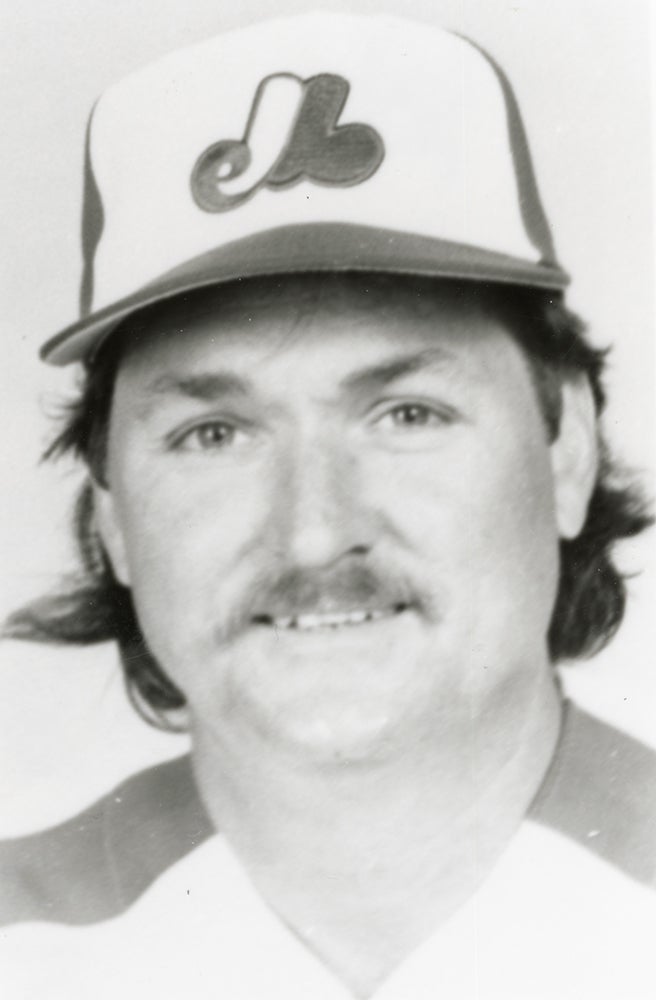
The Expos eventually released Mahler on June 10, and four days later he signed with the Braves, who were beginning a season where they would win the first of 14 straight division titles in seasons that were completed. Mahler appeared in 13 games for Atlanta, making two spot starts but pitching mostly in losing causes. He had an overall record of 2-4 in 23 games with Montreal and Atlanta when the Braves released him on Aug. 8.
When no other teams came calling, Mahler decided to retire. He finished his career with a 96-111 record and 3.99 ERA over 392 games. His brother Mickey pitched in parts of eight big league seasons, going 14-32 with the Braves, Pirates, Angels, Expos, Tigers, Rangers and Blue Jays – pitching his last game in 1986 with Toronto.
Their 110 combined wins rank them in the Top 20 all-time among MLB brother combinations.
In retirement, Rick Mahler served as a minor league pitching instructor for the Royals, Marlins, Cardinals and Mets and managed the Cardinals’ Double-A affiliate in the Texas League (Arkansas) in 1996-97.
He passed away on March 2, 2005, at home in Jupiter, Fla., from a heart attack. He was about to start his second season as a minor league pitching coach with the Mets.
“He was a great guy, a great teammate,” Hall of Famer Tom Glavine told the Associated Press when Mahler died. “I talked to him a lot about pitching when I first came up. He was a big help, especially for a young guy who was struggling. One of those veteran guys who was always trying to help other people.
“My first year in the big leagues, I lost 17 games. He was always there to kind of lift you up. Always upbeat.”
After fashioning a 13-year career in the big leagues that began as an undrafted free agent, Rick Mahler had reason to be happy.
“Rick was a great competitor,” Braves manager Bobby Cox told the AP when Mahler passed away. “He could pitch.”
Craig Muder is the director of communications for the National Baseball Hall of Fame and Museum

